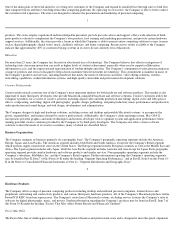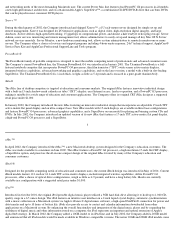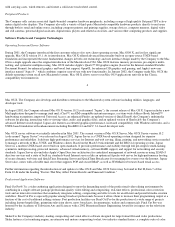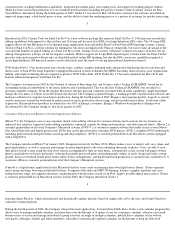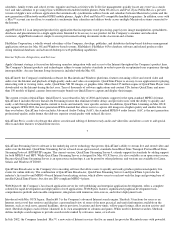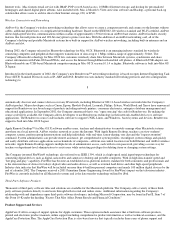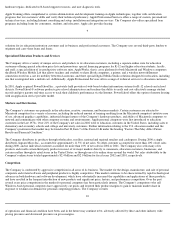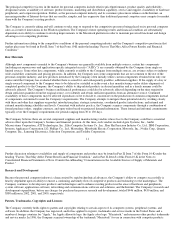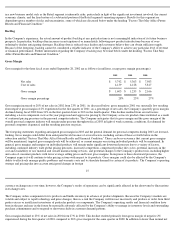Apple 2002 Annual Report Download - page 14
Download and view the complete annual report
Please find page 14 of the 2002 Apple annual report below. You can navigate through the pages in the report by either clicking on the pages listed below, or by using the keyword search tool below to find specific information within the annual report.
Bancroft v. Apple Computer, Inc.
Plaintiff Bancroft filed this purported class action on January 30, 2002 in Los Angeles Superior Court on behalf of a potentially nationwide
class of purchasers of certain Power Macintosh G3 computers. Plaintiff alleges violation of the Consumer Legal Remedies Act ("CLRA")
arising from allegedly poor performance while running the Company's Mac OS X operating system, specifically relating to 2D hardware
acceleration, QuickTime movie hardware acceleration, 3D graphics performance and DVD movie playback. Plaintiff seeks actual damages,
injunctive relief, restitution, punitive damages, attorneys' fees and other relief. The Company has answered the complaint, denying all
allegations and alleging numerous affirmative defenses. The parties participated in mediation in October 2002 without resolution. The parties
are in discovery.
BIAX Corporation v. Apple Computer, Inc.
Plaintiff BIAX filed this action on September 5, 2001 in the United States District Court in Delaware claiming patent infringement relating to
dual processor technology. IBM and Motorola were added as defendants in an amended complaint. Plaintiff seeks unspecified damages and
other relief. The Company has answered the complaint, denying all allegations and asserting numerous affirmative defenses. The Company
also asserted counterclaims requesting a declaratory judgment for non-infringement, unenforceability and invalidity. The parties are in
discovery.
Dynacore Holdings Corp. v. Apple Computer, Inc.
Plaintiff Dynacore filed this action on June 6, 2001 in United States District Court for the Southern District of New York against the Company
and thirteen other defendants claiming patent infringement relating to IEEE 1394 technology, also known as FireWire. Plaintiff claims that any
computer system or other electronic product that uses or complies with the IEEE 1394 standard violates the patent. Plaintiff seeks unspecified
damages and other relief. The Company has answered the complaint, denying all allegations and asserting numerous affirmative defenses. The
Company also asserted counterclaims requesting declaratory judgment for non-infringement and invalidity. Defendants are seeking to amend
the pleading to assert a counterclaim for inequitable conduct against Dynacore. The case was stayed pending the Federal Circuit's decision in
Datapoint Corp. v. Standard Microsystems Corp
., a related case in which plaintiff claimed that its patent was infringed by products complying
with the fast Ethernet standard. In February 2002, the Federal Circuit affirmed the judgment of non-infringement in Datapoint, and the District
Court lifted the stay in this action. The defendants filed a joint motion for summary judgment based upon the decision in Datapoint. The Court
heard the motion on October 4, 2002 and has not yet issued its ruling.
Elonex IP Holdings Ltd., EIP Licensing, B.V. v. Apple Computer, Inc.
Plaintiffs filed this action on February 12, 2001 in the United States District Court in Delaware claiming patent infringement relating to a low
power consumption monitor standby system. Plaintiffs filed numerous identical lawsuits against other computer monitor manufacturers and
computer systems manufacturers. Plaintiffs seek unspecified damages and other relief. The Company answered the complaint, denying all
allegations and asserting numerous affirmative defenses. The Company also asserted counterclaims requesting declaratory judgment for non-
infringement, unenforceability and invalidity of the patents at issue. The parties reached a settlement in July 2002. Settlement of this matter did
not have a material effect on the Company's financial position or results of operations.
FTC Inquiry
–Prado v. Apple Computer, Inc. (and related actions)
In October 1997, Apple began charging all U.S. non-education customers for live telephone technical support beyond 90 days after purchase of
Apple products. In late 1997, the Federal Trade Commission (FTC) commenced an investigation into customer complaints that Apple's change
in technical support practices was either unfair or contrary to earlier representations to certain customers. Four purported class action lawsuits
were filed against Apple related to this change. During the fourth quarter of 1999, the
15
regional and national offices of the FTC approved a settlement with the Company, and a settlement was approved by the Court in three of the
class action suits. In November 1999, two appeals were filed objecting to the settlement. The California Court of Appeal upheld the settlement,
and the California Supreme Court denied review of the Court of Appeal's decision. No further appeals were taken and the Company is
administering the settlement. Settlement of this matter did not have a material effect on the Company's financial position or results of
operations.
Hawaii Structural Iron Workers and Pension Trust Fund v. Apple Computer, Inc. and Steven P. Jobs; Young v. Apple Computer, Inc. et al;
Hsu v. Apple Computer Inc. et al
Beginning on September 27, 2001, three shareholder class action lawsuits were filed in the United States District Court for the Northern
District of California against the Company and its Chief Executive Officer. These lawsuits are substantially identical, and purport to bring suit
on behalf of persons who purchased the Company's publicly traded common stock between July 19, 2000, and September 28, 2000. The
complaints allege violations of the 1934 Securities Exchange Act and seek unspecified compensatory damages and other relief. The Company


